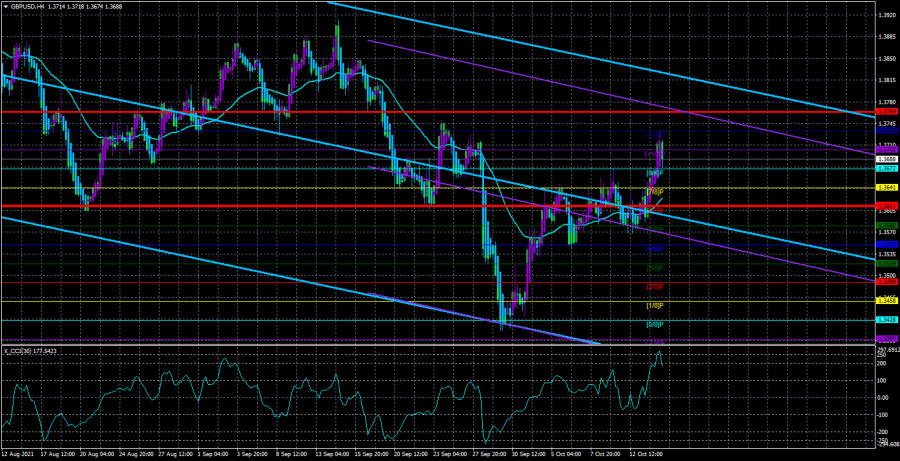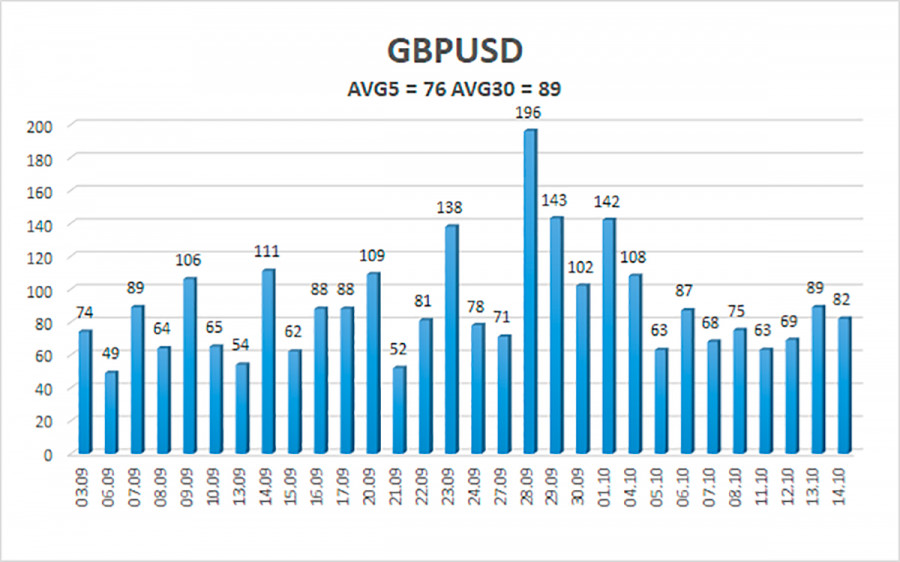Technical details:

Higher linear regression channel: direction - downward.
Lower linear regression channel: direction - downward.
Moving average (20; smoothed) - upward.
The GBP/USD currency pair has completed a week-long period of indistinct movements and has shown a pretty good upward movement in the last two days. Thus, the US currency, which has just started falling against the euro, continues to depreciate for several weeks in a row against the pound. In principle, this is not surprising. We have already said that the pound has a much better chance of growth since it has adjusted against the upward trend by only 30%, and the euro by 50%. Thus, bears are weaker by the pound, and bulls are stronger. Also, based on the factor of injections of hundreds of billions of dollars into the American economy, we have long expected a new fall in the US currency. However, from a technical point of view, the pair has reached its previous local highs near the level of 1.3745. Thus, to continue the upward movement, the price needs to overcome them. Otherwise, a new round of correction may begin. But in general, we continue to support the new upward trend of the pound, which has not reacted in any way to the fundamental background from the UK in the last year anyway. We continue to stand by our opinion that the most important factor influencing the pound/dollar pair is now the factor of monetary injections from the Fed. The Federal Reserve has not announced the curtailment of QE, which means that flows of freshly printed money continue to flow into the economy. We also draw your attention to the fact that, according to the latest COT reports, the bears became more active and sold both European currencies very strongly for the euro and the pound. That's just both currencies have either not declined recently or have been growing at all. Thus, the data of the COT reports may again begin to overlap with such a banal phenomenon as an imbalance of the money supply. If the money supply in the States is growing faster than the money supply in Britain, then the dollar will depreciate. Also, we should not forget that inflation in America has begun to accelerate again.
But the British pound pays no attention at all to the "foundation" and "macroeconomics." This week, it has already ignored reports on unemployment, wages, industrial production, and GDP. And at the same time on American inflation. Also, the British currency ignores many events related to Brexit and its consequences. However, it's still a sin for us to complain: a few weeks ago, the British currency collapsed on the news about the "fuel crisis" and then recovered for more than a week on the news about the improvement of the situation at British gas stations. However, it was not possible to solve the "fuel crisis" structurally. Yes, the British government has attracted the military as long-distance drivers, simplified the procedure for obtaining a work permit for foreign drivers, and abolished the mandatory three-day certification for British drivers. However, this did not improve the logistics. The British are now in panic buying up all the most necessary goods and products, and the media predict a shortage of many goods in the coming weeks, especially at Christmas.
Thus, many residents of the UK are already stocking up for the holidays, which will be only in 2.5 months. What provokes an even greater shortage of some goods. According to recent surveys, one in three Britons makes stocks for the future, and one in six cannot buy all the food they need. The Office for National Statistics is talking about half-empty shelves in stores, and hundreds of thousands of customers are booking delivery for December 25 right now. Two-thirds of all respondents are concerned about the possible shortage of some goods.
Consequently, the "logistical crisis" is not resolved in any way, despite all the efforts of Boris Johnson and his team. The pound is still growing, as it has been used to in the last year and a half. However, with the aggravation of the situation with goods and fuel, it may again come under pressure from market participants. At this time, both linear regression channels are still directed downwards, which means that the downward trend can still resume.

The average volatility of the GBP/USD pair is currently 76 points per day. For the pound/dollar pair, this value is "average." On Friday, October 15, we expect movement inside the channel, limited by the levels of 1.3612 and 1.3764. The reversal of the Heiken Ashi indicator downwards signals a round of corrective movement.
Nearest support levels:
S1 – 1.3672
S2 – 1.3641
S3 – 1.3611
Nearest resistance levels:
R1 – 1.3702
R2 – 1.3733
Trading recommendations:
The GBP/USD pair continues to move up on the 4-hour timeframe. Thus, at this time, it is necessary to remain in long positions with the targets of 1.3733 and 1.3764 levels until the Heiken Ashi indicator turns down. Sell orders can be considered again if the price is fixed below the moving average line with targets of 1.3580 and 1.3550 and keep them open until the Heiken Ashi turns up.
Explanations to the illustrations:
Linear regression channels - help determine the current trend. If both are directed in the same direction, then the trend is strong now.
Moving average line (settings 20.0, smoothed) - determines the short-term trend and the direction in which trading should be conducted.
Murray levels - levels for movements and corrections.
Volatility levels (red lines) - the likely price channel the pair will spend the next day, based on current volatility indicators.
CCI indicator - its entry into the oversold area (below -250) or into the overbought area (above +250) means that a trend reversal in the opposite direction is approaching.
The material has been provided by InstaForex Company - www.instaforex.comfrom RobotFX















 Download NOW!
Download NOW!
No comments:
Post a Comment